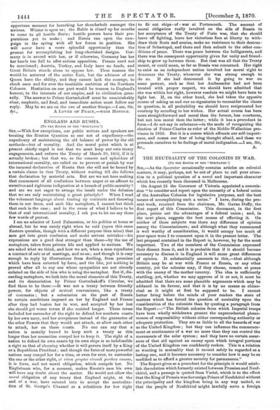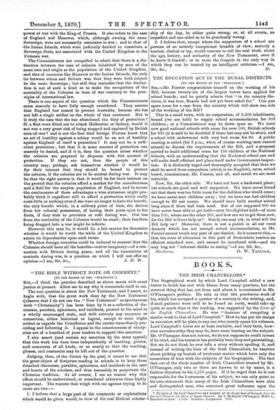THE NEUTRALITY OF THE COLONIES IN WAR.
[TO THE EDITOR OF THE "SPEOTATOR."] SIR,—As the Spectator occasionally contains articles on colonial matters, it may, perhaps, not be out of place to call your atten- tion to a political question of a novel and important character which has recently been discussed in Melbourne.
On August 24 the Governor of Victoria appointed a commis- sion " to consider and report upon the necessity of a federal union of the Australian Colonies for legislative purposes, and the beat means of accomplishing such a union." I have, during the pre- sent week, received from the chairman, Mr. Gavan Duffy, the first report of this Commission. This document, in the first place, points out the advantages of a federal union ; and, in the next place, suggests the best means of effecting it. On neither of these subjects was there any difference of opinion among the Commissioners ; and although what they recommend is well worthy of consideration, it would occupy too much of your space were I to comment upon it in the present letter. The last proposal contained in the Report is, however, by far the most important. Two of the members of the Commission expressed their dissent from it, and it is probable that if it should become necessary to discuss it in England it will cause great differences of opinion. It substantially amounts to this,—that although Britain may be at war with France or Russia, or any other country, yet the colonies may, if they choose, remain at peace with the enemy of the mother country. The idea is sufficiently startling, yet, whether we may approve of it or not, it must be admitted that there are some plausible arguments which may be adduced in its favour, and that it is by no means so chime- rical as it might at first be supposed to be. I cannot better bring before the minds of your readers the state of matters which has forced the question of neutrality upon the consideration of the colonists than by quoting a paragraph from the Report :—" The British colonies from which Imperial troops have been wholly withdrawn present the unprecedented pheno- menon of responsibility without either corresponding authority or adequate protection. They are as liable to all the hazards of war as the United Kingdom ; but they can influence the commence- ment or continuance of a war no more than they can control the movements of the solar system ; and they have no certain assur- ance of that aid against an enemy upon which integral portions of the United Kingdom can confidently reckon. This is a relation so wanting in mutuality that it cannot safely be regarded as a lasting one, and it becomes necessary to consider how it may be so modified as to afford a greater security for permanence."
The Report gives as a precedent for the principle it would estab- lish the relation which formerly existed between Prussian and Neuf- chatel, and a passage is quoted from Vattel, which is to the effect that the King of Prussia was Sovereign Prince of Neufchatel without the principality and the kingdom being in any way united, so that the people of Neufchatel might lawfully serve a foreign
rpower at war with the King of Prussia. It also refers to the case of England and Hanover, which, although owning the same Sovereign, were not necessarily associates in war ; and to that of 'the Ionian Islands, which were judicially decided to constitute a Sovereign State, not associated with the United Kingdom in the Crimean war.
The Commissioners are compelled to admit that there is a dis- tinction between the case of colonies inhabited by men of the -same race and origin as the population of the United Kingdom, and that of countries like Hanover or the Ionian Islands, the only tie between whom and Britain was that they were both subject to the same Sovereign ; but still they maintain that the distinc- tion is not of such a kind as to make the recognition of the • neutrality of the Colonies in time of war contrary to the prin- • oiples of international law.
There is one aspect of the question which the Commissioners seem scarcely to have fully enough considered. They assume that England has ceased to protect Australia, because she has mot left a single soldier on the whole of that continent. But is 'it truly the case that she has abandoned the duty of protection ? 4f a fleet were fitted out to attack Melbourne or Sydney, would it not run a very great risk of being stopped and captured by British mien-of-war? and is not the fact that foreign Powers know that an act of hostility against a colony would be an act of hostility against England of itself a protection ? It may not be a suffi-
• eient protection ; but that it is some amount of protection can -scarcely be denied, and if it is, then the question arises whether 'the colonies are prepared to dispense with this amount of protection. If they are not, then the people of this • country may, perhaps, ask themselves whether it would be for their interest that they should be bound to protect
• the colonies, if the colonies are to be neutral during war. It may 'be that the right answer is that it would be for their interest on 'the ground that the colonies afford a market for the manufactures and a field for the surplus population of England, and to secure the continuance of these advantages a wise statesman might pro- bably think it expedient still to afford a protection which really costs little or nothing even if she were no longer to have the benefit, the only benefit which, in a military point of view, she derives from her colonial possessions, of having their ports open to her fleets, if they wish to provision or relit during war. Our loss
• from the neutrality of the Colonies would be small ; their loss from being dragged into a war might be infinite.
However this may be, it would be a fair matter for discussion whether it would be worth the while of the United Kingdom to ,retain its dependencies upon such terms.
Whether foreign countries could be induced to consent that the Colonies should have all the benefits—real or imaginary—of a con- vection with Britain during peace, and all the immunities of centrals during war, is a question on which I will not offer an



































 Previous page
Previous page